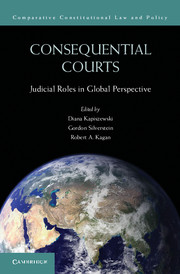Book contents
- Frontmatter
- Contents
- Contributors
- Introduction
- PART I EXPANDING JUDICIAL ROLES IN NEW OR RESTORED DEMOCRACIES
- Part II EXPANDING JUDICIAL ROLES IN ESTABLISHED DEMOCRACIES
- PART III FOUR “PROVOCATIONS”
- 13 Why the Legal Complex is Integral to Theories of Consequential Courts
- 14 Judicial Power
- 15 Constitutional Politics in the Active Voice
- 16 The Mighty Problem Continues
- Conclusion Of Judicial Ships and Winds of Change
- Index
- References
15 - Constitutional Politics in the Active Voice
Published online by Cambridge University Press: 05 April 2013
- Frontmatter
- Contents
- Contributors
- Introduction
- PART I EXPANDING JUDICIAL ROLES IN NEW OR RESTORED DEMOCRACIES
- Part II EXPANDING JUDICIAL ROLES IN ESTABLISHED DEMOCRACIES
- PART III FOUR “PROVOCATIONS”
- 13 Why the Legal Complex is Integral to Theories of Consequential Courts
- 14 Judicial Power
- 15 Constitutional Politics in the Active Voice
- 16 The Mighty Problem Continues
- Conclusion Of Judicial Ships and Winds of Change
- Index
- References
Summary
The passive voice is preferred by many students of comparative judicial politics during the prologue to their tales of judicial power. Constitutions are framed and ratified. Legal and constitutional rules and standards are announced. The precise meaning of these rules and standards is debated. Courts are established. Judges are appointed. Jurisdiction is conferred. Legal and constitutional disputes are placed on the agenda of these courts. Legal and constitutional arguments are made. Agency is absent from both sentences and analysis.
Constitutional politics shifts sharply to the active voice between oral argument and disposition. Judges make decisions. Many elected officials oppose those judicial rulings. Executives refuse to implement court orders. Legislators propose contrary constitutional amendments. Political activists demand that elected officials replace the offending judges by legal or extralegal means. Supporters who mobilize to defend the judicial decision wax eloquent on the virtues of an independent judiciary.
- Type
- Chapter
- Information
- Consequential CourtsJudicial Roles in Global Perspective, pp. 363 - 379Publisher: Cambridge University PressPrint publication year: 2013
References
- 3
- Cited by



